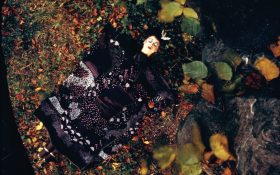The son of a Scottish father and Ghanaian mother, Bruce Fummey self-deprecatingly bills himself as the hottest thing on the Afro-Celtic comedy circuit. It’s a circuit that he also points out consists of, well, him.
But Fummey is very obviously selling himself short. His mixture of education and comedy (or “educomedy” as he calls it) has much broader appeal than he would admit – last year’s attempt to bring physics to the Fringe, The Greek, the Apple and the Time Machine, like his first on Tam O’Shanter, was a sell-out.
About the Jacobites, retells the most romantic period of Scottish history, which began when catholic James II of England (James VI of Scotland) lost his job to his own daughter Mary and her protestant husband William, and finished when the supporters of Bonnie Prince Charlie were routed at the Battle of Culloden in 1745.
Fummey begins his hour long show by saying that everyone should expect to leave disappointed – those looking for comedy will be getting educated and those looking for education will be getting gags.
Fummey’s theory is that you can’t understand Scottish history without understanding the people which, he says, are driven partly by a pathological intent to do exactly what London tells them they cannot (ie wear kilts, speak Gaelic and deep fry anything they can get their hands on), and partly by the refusal of English merchants to take Scottish tenners.
He also says that his own epiphany into Scots history came in a Yorkshire pub. He was bored after a show, and decided to go out to meet the locals. The English, he said, were polite and respectful, but they showed no interest in him at all. It wasn’t until he bumped into a fellow Scot that the night got underway, the two became drinking buddies, began attracting more Scots to them, and ended up then fighting drunkenly amongst themselves at two in the morning.
It isn’t all one sided – he points out that the Scots were prone to looting, that not everyone supported the rebellions (and not just the Campbells), and that in reality, the rebellions were often supported by as many of the English. In fact, during Charlie’s ill-fated march down as far as Derby, towns as far south as Reading were rebelling, and it was the Mancurians who suffered the most when the rebellion was put down.
It all leads Fummey to conclude that history’s a crazy, messed-up thing and even our national stories are really just one interpretation. It’s something any student of history could have told you in the first place, but one that much of the world currently seems to have forgotten. And of course it’s one that is more enjoyably told when Fummey tells it.
A regular on the comedy circuit, it’s a shame that he didn’t have a bigger room. It’s Fummey’s third Fringe, but tucked away at the top of the Beehive pub off Grassmarket, it was hardly a top billing, and the lack of signs led to a bit of confusion in finding the place. Fummey’s own teenage son was doorman, ticket seller, and PR man, diligently asking the punters to complete tiny survey cards as they left. Perhaps the only advantage of the location was that Fummey got to drink a Guinness as he presented his show, as did the audience.
All in all, a good show, an hour well spent, and I don’t think anyone left disappointed – just more educated, and having had a few good laughs.




